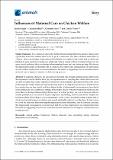Files in this item
Influences of maternal care on chicken welfare
Item metadata
| dc.contributor.author | Edgar, Joanne | |
| dc.contributor.author | Held, Suzanne | |
| dc.contributor.author | Jones, Charlotte | |
| dc.contributor.author | Troisi, Camille | |
| dc.date.accessioned | 2016-01-27T22:40:20Z | |
| dc.date.available | 2016-01-27T22:40:20Z | |
| dc.date.issued | 2016-01-05 | |
| dc.identifier | 240524630 | |
| dc.identifier | 7f1c027a-7d3f-40f2-852c-f25307fba9ad | |
| dc.identifier | 26742081 | |
| dc.identifier | 84955306391 | |
| dc.identifier | 000422947100002 | |
| dc.identifier.citation | Edgar , J , Held , S , Jones , C & Troisi , C 2016 , ' Influences of maternal care on chicken welfare ' , Animals , vol. 6 , no. 1 , 2 . https://doi.org/10.3390/ani6010002 | en |
| dc.identifier.issn | 2076-2615 | |
| dc.identifier.other | ORCID: /0000-0002-4036-3848/work/40996093 | |
| dc.identifier.uri | https://hdl.handle.net/10023/8090 | |
| dc.description | This review was funded by a BBSRC Future Leader Fellowship to Joanne Edgar. | en |
| dc.description.abstract | In domestic chickens, the provision of maternal care strongly influences the behavioural development of chicks. Mother hens play an important role in directing their chicks' behaviour and are able to buffer their chicks' response to stressors. Chicks imprint upon their mother, who is key in directing the chicks' behaviour and in allowing them to develop food preferences. Chicks reared by a mother hen are less fearful and show higher levels of behavioural synchronisation than chicks reared artificially. In a commercial setting, more fearful chicks with unsynchronised behaviour are more likely to develop behavioural problems, such as feather pecking. As well as being an inherent welfare problem, fear can also lead to panic responses, smothering, and fractured bones. Despite the beneficial effects of brooding, it is not commercially viable to allow natural brooding on farms and so chicks are hatched in large incubators and reared artificially, without a mother hen. In this review we cover the literature demonstrating the important features of maternal care in domestic chickens, the behavioural consequences of deprivation and the welfare implications on commercial farms. We finish by suggesting ways to use research in natural maternal care to improve commercial chick rearing practice. | |
| dc.format.extent | 414244 | |
| dc.language.iso | eng | |
| dc.relation.ispartof | Animals | en |
| dc.subject | Animal welfare | en |
| dc.subject | Behaviour | en |
| dc.subject | Chicken | en |
| dc.subject | Domestic | en |
| dc.subject | Hen | en |
| dc.subject | Imprinting | en |
| dc.subject | Laying | en |
| dc.subject | Maternal | en |
| dc.subject | Simulation | en |
| dc.subject | Social learning | en |
| dc.subject | SF Animal culture | en |
| dc.subject.lcc | SF | en |
| dc.title | Influences of maternal care on chicken welfare | en |
| dc.type | Journal article | en |
| dc.contributor.institution | University of St Andrews. School of Biology | en |
| dc.identifier.doi | 10.3390/ani6010002 | |
| dc.description.status | Peer reviewed | en |
This item appears in the following Collection(s)
Items in the St Andrews Research Repository are protected by copyright, with all rights reserved, unless otherwise indicated.

